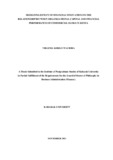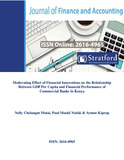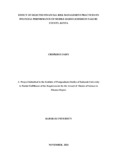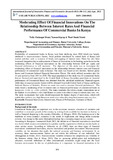MEDIATING EFFECT OF FINANCIAL INNOVATION ON THE RELATIONSHIP BETWEEN ORGANIZATIONAL CAPITAL AND FINANCIAL PERFORMANCE OF COMMERCIAL BANKS IN KENYA
Abstract
The purpose of the study was to investigate the mediating effect of financial innovation
on the relationship between organizational capital and financial performance of
Commercial Banks in Kenya. Purposely the study sought to examine the relationship
between financial knowledge and expertise and financial performance of commercial
banks in Kenya. It also evaluated the relationship between financial business process and
practice and financial performance. Assessment of the relationship between human
capital and financial performance and assess the mediating effect of financial innovation
on the relationship between organizational capital and financial performance of
commercial banks was done. A census survey was carried out on all the 41 licensed
commercial banks in Kenya. Out of the 123 respondents that were targeted, all responded
constituting a response rate of 100%. Hypotheses were tested using a combination of
multivariate techniques, including regression analysis, chi-Square, RMSEA, GFI and
NFI to address the mediating effect as well as model complexity, estimating constructs
and latent variable scores. The findings found that financial knowledge and expertise had
a positive relationship with the financial performance of commercial banks There was a
strong positive relationship between the financial business process and financial
performance of commercial banks. This implies that organizational capital leads to
enhanced financial performance. The results also revealed that there was a significant
positive relationship between human capital and financial performance of commercial
banks. The study confirmed that the combined effect of financial innovation (ATMs,
internet banking, Mobile banking and Debit cards) mediated the relationship between
organizational capital and financial performance of commercial banks. This study
contributes to understanding the mediating effect of financial innovation and financial
performance as well as confirming the finding of previous studies that have found a
significant link of mediating effect of financial innovation and financial performance of
commercial banks. The study used T statistical tests which indicated that financial
innovation had a mediating effects effect on organizational capital and financial
performance (β=0.378, p< 0.05). The study also brings out that increased understanding
of financial knowledge and expertise can enhance financial performance of Commercial
Banks. Firms should strengthen their financial business process and practice since it
plays a significant role in channeling funds to the industries as well as contributing
towards economic, financial growth and stability. Financial institutions like banks can
also enhance financial performance by building on their human capital through customer
relations, employee relations and increased customer loyalty. Several financial
performance parameters such as Return on Assets (ROA) and Earnings Before Interest
and Tax (EBIT) were used to measure the financial position for the commercial banks.
Liquidity preference Theory, Diffusion of Innovation Theory and Transaction Cost
Theory guided this study. The study was carried out in Nairobi‘s since over all of the
Commercial Banks head offices are based in Nairobi. The study respondents were the
bank operation managers, credit managers and transactional banking manager. A self administered
and open-ended questionnaire was used to collect primary data while
secondary data was obtained through documentary analysis of audited published
financial statements.
Collections
Related items
Showing items related by title, author, creator and subject.
-
Moderating Effect of Financial Innovations on the Relationship Between GDP Per Capita and Financial Performance of Commercial Banks in Kenya
Mutai, Nelly Chelangat; Nzioki, Paul Muoki; Kiprop, Symon (Stratford Peer Reviewed Journals and Book Publishing, 2022-09)Profitability of commercial banks in Kenya have been declining since 2010 which was largely attributed to macro-economic factors, fiscal policies introduced by central bank of Kenya and market activities such as issuance ... -
EFFECT OF SELECTED FINANCIAL RISK MANAGEMENT PRACTICES ON FINANCIAL PERFORMANCE OF MOBILE-BASED LENDERS IN NAKURU COUNTY, KENYA
CHEPKIRUI, DAISY (2024-11)This study analyzed the quick rise of mobile-based lending in Kenya, which have introduced a variety of financial risks that might have an influence on lenders' financial performance. The study sought to bridge this knowledge ... -
Moderating Effect Of Financial Innovations On The Relationship Between Interest Rates And Financial Performance Of Commercial Banks In Kenya
Mutai, Nelly Chelangat; Kiprop, Symon; Nzioki, Paul Muoki (International Journal of Innovative Finance and Economics Research, 2022-07)Profitability of commercial banks in Kenya have been declining since 2010 which was largely attributed to macro-economic factors, fiscal policies introduced by central bank of Kenya and market activities such as issuance ...




